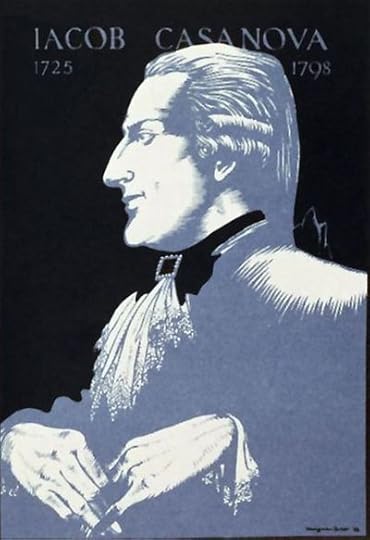Views of Casanova
From The Fable of Casanova (1934)
By ADRIAN TAHOURDIN
There���s a wonderful review by David Coward in this week���s TLS of a new French edition of Giacomo Casanova���s Histoire de ma vie. Coward gives us as rounded a portrait of the Venetian adventurer as we could hope for in 2,500 words.
As Coward reminds us, the book runs to well over a million words and was written in Italianate French, French being the lingua franca of eighteenth-century Europe. There is an English translation in print entitled History of My Life, single-handedly completed by the heroic American scholar Willard R. Trask. It first appeared in six substantial annotated volumes in the 1960s, and seems unlikely to be superseded.
History of My Life is generally reckoned to be one of the great eighteenth-century autobiographies, ranked alongside Rousseau���s Confessions. The great American critic Edmund Wilson called it the ���most interesting memoirs ever written���.
One of Casanova���s most fervent advocates is the French novelist and critic Philippe Sollers, who is not beyond speculating on occasion: ���it���s easy to imagine that he met Mozart���. He describes his hero as ���a handsome man with a very dark complexion���, and points out that he was 1 metre 87 in height (he couldn���t stand up properly in his prison cell in Venice). Sollers���s Casanova l���admirable was published in 1998 (the 200th anniversary of Casanova���s death), and has now appeared in English as Casanova the Irresistible (translated by Armine Kotin Mortimer; 154pp; University of Illinois Press). The review copy came into the TLS offices too late to be included in Coward���s review, although the French edition was favourably reviewed in 1998 by the late Robin Buss.
Sollers���s book takes the form of an erudite meditation on Casanova���s life and his potent afterlife. It is not without humour: while in prison, Casanova is prey to ���the fleas, the permanent sweating, hemorrhoids, fever, and, on top of that, debilitating mystical readings ��� why not, while they���re at it, a collection of sermons by the Dalai Lama?��� Elsewhere he writes, ���if Casanova were put in prison today, the black humor would be to want to re-educate him by making him study the complete works of Pierre Bourdieu in depth, for example��� (Sollers has had his battles with fellow Parisian intellectuals over the decades, including the sociologist and anthropologist Bourdieu).
The author has fun at the expense of Casanova���s first editor, the Frenchman Jean Laforgue who, not content with correcting Casanova���s French, removed passages he disapproved of. For Sollers ,���Laforgue is a specialist of the fig leaf (each period has such ���restorers���)���. ���Women perspiring, odors, food, political opinions: it all needs to be kept under surveillance. If Casanova writes ���the low people of Paris���, he���ll be made to say ���the good people������. Sollers adds, ���A woman, according to the professor, cannot be represented lying on her back while ���masturbating���. No, she will be ���in the act of deluding herself��� (understand it if you can)���.
An interesting aspect of reading a translation of a book published seventeen years ago is observing how the world has moved on in the intervening period. For example, Sollers is scornful of a fast- food restaurant in Prague called Casanova ��� an abomination, in his eyes. He imagines a book entitled The Cooking of Casanova. He is becoming ���a brand name���. Well, yes, all this has happened, and more.
Peter Stothard's Blog
- Peter Stothard's profile
- 30 followers





